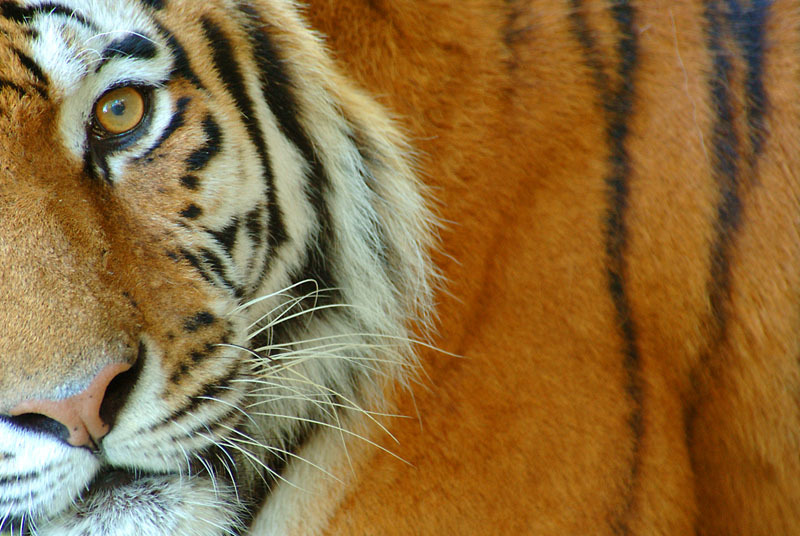The idea of a world with no tigers is unthinkable. But it’s now perilously close to reality.
Tiger tiger burning bright
In the forests of the night
What immortal hand or eye
Could frame thy fearful symmetry?
They’re the kings of the jungle, revered in many cultures. They wield extraordinary power over our imaginations.
But tigers are vulnerable.
Throughout its vast home range in Asia – from the snowy Russian Far East to the tropical peat swamps of Sumatra and the golden grasslands of India – the world’s most iconic cat is stalking silently into an increasingly precarious future.
What’s at stake
The latest Year of the Tiger in the Chinese calendar, which ended in January 2011, showed just how desperate the plight of the tiger really is.
Since the start of the last century, the world has lost 97% of its tigers. Once, 100,000 tigers roamed across Asia. Even as late as the 1980s, there were 20,000.
Today, just 3,200 remain in the wild.
Habitat destruction and rampant poaching have pushed tigers to the brink of extinction. Tigers have lost more than nine-tenths of their former habitat. Three of the nine subspecies found at the beginning of the past century – the Bali, Javan and Caspian – are now extinct. A fourth – the South China tiger – hasn’t been seen in the wild for more than 20 years.
Without urgent action, tigers could be virtually extinct in the wild by 2022 – the time of the next Year of the Tiger in the Chinese calendar.
The time is now to save this global symbol of nature’s stunning beauty. We’re rallying the action need to meet our goal of doubling tiger numbers by 2022.
The story so far
We’ve had successes before that give us hope.
In the late 1940s, only around 40 Amur (Siberian) tigers remained in the wild. But they’ve made a remarkable comeback in the decades since.
We’ve expanded tiger protection areas to conserve their habitat, and helped local people mount tough anti-poaching operations to combat the illegal trade in tiger parts. We have worked on recovering prey species, so the tiger has enough to eat. This helped Amur tigers to become the only subspecies that has increased in numbers over the last 15 years. Now around 400 Amur tigers roam the wild.
In the 1970s, we helped reverse a steep decline in the population of India’s tigers. And in the areas where we run projects – including support for anti-poaching patrols and collaboration with communities – numbers have remained relatively stable.
In 2010 we helped bring together leaders from the 13 countries that still have tigers in the wild to attend a tiger summit in Russia. It was the first ever international summit dedicated to a single wild species. Roared on by more than 250,000 WWF supporters online, they gave their backing to an ambitious plan to reverse the tiger’s decline.
The 13 countries, backed by scientists, governments and institutions worldwide, have adopted our goal of doubling tiger numbers by 2022.
Did you know?
There are more tigers in captivity in the United States than there are in the wild.
Facts and Stats
- 100,000 – tigers in the wild in 1900
- 3,200 – tigers in the wild today
- 1,000 – minimum number of tigers killed by poachers over the last decade
- < 400 – remaining Sumatran tigers
- 97: Percentage of tiger population lost in just 100 years
- 6 – subspecies of tigers left in the wild: the Bengal, Amur (Siberian), Malayan, Indochinese, Sumatran and South China (which has not been seen in over 20 years and also may be extinct)
What’s next?
We’ve launched an ambitious plan to save tigers. It’s based on:
- Protecting and connecting tiger habitats on a huge scale. We’re seeking to protect tigers, their prey and habitat across 12 large-scale landscapes.
- Clamping down on poaching and eliminating the illegal tiger trade that drives it. We’re working with our partners TRAFFIC to halt the trade in tigers and reduce demand for tigers and their body parts.
- Increasing political will, commitment and funding. WWF has already committed to spend US$50 million on tiger conservation over the next five years, with a goal of increasing that to US$85 million.
- Tigers are cats. With space and food, they will breed fast and freely. Their numbers can recover.
WWF in action
- WWF staff member Pavel Fomenko helped catch almost 2,000 tiger poachers in a single year. Find out about his work to protect the Amur tigers of Russia: http://www.vimeo.com/10238712.
- In 2010, Anatoly Belov from Russia received WWF’s highest conservation honour, the Duke of Edinburgh award, for his heroic efforts in the Russian Far East. Belov and his team have caught around 1,000 poachers and brought dozens of criminal cases against tiger poachers. He has been shot three times while carrying out his tiger patrolling duties.
- In January 2011, WWF worked with authorities in Nepal to successfully carry out the country’s first ever tiger translocation. An injured male was moved to a safe location in Bardia National Park from Chitwan National Park.
What you can do
- Buy forest-friendly products. By choosing wood and paper certified by the Forest Stewardship Council (FSC), you can be sure you’re not contributing to the destruction of tiger habitats.
- Avoid traditional Asian medicines that contain tiger parts.
- Donate to our tiger projects
- Find out how you can help protect tigers.
***************************************
Join the myWWF Action Center
Be part of a global community of activists ready to take simple online actions that can help save wildlife and people. Sign up today!
***************************************














